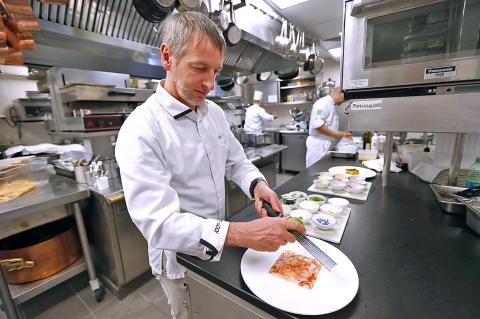France has many restaurants claiming the “bio” label, but only one to earn a star in the fabled Michelin Guide: Elsa, a Riviera eatery run by an Italian chef, Paolo Sari.
Sari boasts he takes the credo to such lengths that his 40-seat restaurant barely outside Monaco’s border is “the only certified 100 percent bio establishment in the world.”
Certainly he is inflexible in ensuring his Mediterranean cuisine, mixing French and Italian recipes, is entirely organic and sourced from local and near-local producers.

Photo: AFP
That means his asparagus comes from a village in Provence, his saffron from a mountaintop village near Nice and seafood direct from fishermen. His almonds come from Sicily and go to make a diabolically delicious souffle.
Beef, though, is one ingredient that does not feature on his menu because there is no organic cattle farm nearby.
“Each ingredient, each supplier, even each transporter needs to have a certification,” Sari said.
Organization is key, with records provided on every menu and the percentage of dishes sold, “because an inspector could come to check at any moment.”
“I let the ingredients be the star, after a fanatic search for good products,” the chef said.
He then adds his own “little touches.”
Three years of that approach earned Elsa — which is part of a resort called Monte-Carlo Beach — its Michelin star last year.
Maintaining the all-bio standards, though, does not come cheap. Supplier costs are 20 percent higher than for food coming from traditional sources using industrial techniques.
“In the beginning, it was expensive. Scarcity makes for expense,” Monte-Carlo Beach director Daniele Gercelon said. “Then we expanded the range of suppliers for greater reliability, choice and volume.”
Now, she added, she is looking to implement the bio approach to the other eateries at the resort, which is part of a bigger, Monaco-based group managing several restaurants and hotels.
The winter closure of the Elsa restaurant between October and March means Sari only needs to find fresh seasonal produce in the warmer months, when it is at its most abundant.
He also has access to a 3 hectare private farm in Roquebrune-Cap-Martin, the French village where the restaurant is located, which butts up against Monaco. It also relies on another, 2 hectare plot of land in San Remo, a town just over the Italian border, 20km away.
Sari, 45, said his experience working in restaurants in Japan, South Korea, China, Switzerland, London, New York, Los Angeles, Moscow and Venice gave him a broad range of influences, but he preferred an Asian “simplicity” in the presentation of his dishes.
Among his fare is an entree of green asparagus with generous slices of black truffle on a bed of potatoes.
There is also a risotto made golden with saffron and a touch of bone marrow, and roast lamb ribs coated with acacia honey and accompanied by knob celery.
The wine, naturally, is all bio as well, with nearly 100 choices to match the meals.
Diners have a choice of desserts: a tarte tatin/creme brulee fusion, mini crepes Suzette with caramelized pears, or — France and Italy united — a Saint-Honore puff pastry cake married with tiramisu.

Quanta Computer Inc (廣達) chairman Barry Lam (林百里) is expected to share his views about the artificial intelligence (AI) industry’s prospects during his speech at the company’s 37th anniversary ceremony, as AI servers have become a new growth engine for the equipment manufacturing service provider. Lam’s speech is much anticipated, as Quanta has risen as one of the world’s major AI server suppliers. The company reported a 30 percent year-on-year growth in consolidated revenue to NT$1.41 trillion (US$43.35 billion) last year, thanks to fast-growing demand for servers, especially those with AI capabilities. The company told investors in November last year that

Intel Corp has named Tasha Chuang (莊蓓瑜) to lead Intel Taiwan in a bid to reinforce relations between the company and its Taiwanese partners. The appointment of Chuang as general manager for Intel Taiwan takes effect on Thursday, the firm said in a statement yesterday. Chuang is to lead her team in Taiwan to pursue product development and sales growth in an effort to reinforce the company’s ties with its partners and clients, Intel said. Chuang was previously in charge of managing Intel’s ties with leading Taiwanese PC brand Asustek Computer Inc (華碩), which included helping Asustek strengthen its global businesses, the company

Taiwanese suppliers to Taiwan Semiconductor Manufacturing Co. (TSMC, 台積電) are expected to follow the contract chipmaker’s step to invest in the US, but their relocation may be seven to eight years away, Minister of Economic Affairs J.W. Kuo (郭智輝) said yesterday. When asked by opposition Chinese Nationalist Party (KMT) Legislator Niu Hsu-ting (牛煦庭) in the legislature about growing concerns that TSMC’s huge investments in the US will prompt its suppliers to follow suit, Kuo said based on the chipmaker’s current limited production volume, it is unlikely to lead its supply chain to go there for now. “Unless TSMC completes its planned six

Power supply and electronic components maker Delta Electronics Inc (台達電) yesterday said it plans to ship its new 1 megawatt charging systems for electric trucks and buses in the first half of next year at the earliest. The new charging piles, which deliver up to 1 megawatt of charging power, are designed for heavy-duty electric vehicles, and support a maximum current of 1,500 amperes and output of 1,250 volts, Delta said in a news release. “If everything goes smoothly, we could begin shipping those new charging systems as early as in the first half of next year,” a company official said. The new